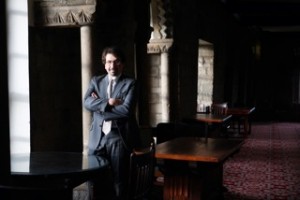
British political theorist David Held about dangers of military intervention in Syria and the necessity to speak to bad guys.
David Held, 62, specializes in the field of international relations, cosmopolitan democracy and global governance. The British political theorist taught at the “London School Of Economics”, but resigned in 2010, when the university admitted it had accepted funding from the Gaddafi Foundation. Held had informally advised Saif al-Islam Gaddafi, son of dictator Muammar, while he was writing his Phd at the LSE till 2008. Today Held is master of University College Durham. His latest book was published in July by Polity Books: “Gridlock. Why global Cooperation is Failing When We Need It Most”.
Profil: Should the West take the Russian initiative seriously to put Syria’s chemical weapons under international control?
Held: It is hard to see how the Russian plan will stick. But the initiative is certainly one thing: A good example for diplomacy in a multipolar world. The US threatened a military intervention. This brought the Russians to come up with their diplomatic initiative. Syria accepted to have their chemical weapons put under international control. We could potentially get a security council resolution on it. That could be a breakthrough.
Profil: Will the US step back from their military penalty mission?
Held: The Americans have been outmaneuvered by the developments. The new plan will weaken the prospects for military action. But the Americans might be too far down the line to stop. In any case: Both the military intervention and the new Russian initiative are not designed to stop the civil war in Syria. In my view it will further embolden the rebel forces, but at the same time will make the Assad forces fight with ever more desperation. And it could of course drag in Israel and other countries in the area. So of course the only solution can be a political one. We need to talk to Russia and to Iran. Everyone needs to be at the negotiation table.
Profil: Also Assad?
Held: I think a solution might be to allow Assad to stay in power for a limited period of time.
Profil: Does the West then not show weakness?
Held: Not at all. Syria shows how important it is to take organizations like the United Nations seriously. In my book “Gridlock” I call for the need of deep reforms. The world became multipolar, the hegemony of the US is threatened. The Americans have a more difficult time to be seen as progressive power and to get heard. Even close allies like Great Britain do not follow them anymore automatically into a coalition. But we cannot come to a resolution in the Security Council because the organization is in gridlock and where there is gridlock there is also drift.
Profil: In the case of Syria, Russia and China simply blocked everything.
Held: Yes. But Russia and China had various reasons to block all the resolutions on Syria. They had the clear feeling that UN resolution 1973 to Libya was abused in 2011. It was adopted to protect the opposition in Benghazi - but in the end it served as legitimization for regime change, for removing Muammar Gaddafi. This is why Russians and Chinese are very careful today.
Profil: Doesn’t the Russian initiative to Syria come very late?
Held: We could have already done a lot: no-fly-zones, safe havens, humanitarian corridors. Military intervention has lost its good reputation because all military interventions after 9/11 were humanitarian and political catastrophes. When the Americans leave Afghanistan, then we will have there in the best scenario a status quo ante bellum. In Libya there is no central power left. Oil production has collapsed, workers in the oil industry have not been paid anymore and threaten to sell the oil on the black market.
Profil: Should the West not have pushed Gaddafi out?
Held: None of the arguments I mentioned should lead us to not intervene anymore militarily or in humanitarian ways. We need to figure out with which legitimacy we do what. We need strong international institutions to prop up our resolutions. We can only understand the multipolar world, if we engage with other cultures, understand their language and exchange knowledge.
Profil: Is this why you accepted Saif Gaddafi, the son of the Libyan dictator, as a PhD student?
Held: When Saif Gaddafi knocked on my door, should I have sent him away? Of course not. Teachers have only one task: to teach. I think, Saif had genuine interest at the time in reforms in Libya. The sins of the father are not automatically the sins of the son.
Profil: By now they are. Would you still accept him today?
Held: No. Today he is a case for criminal justice. It would have been better to bring him to an International Court. In Libya he will not get a fair trial.
Profil: Was it a mistake of the London School of Economics to accept funds of the Gaddafi foundation?
Held: It would certainly be better, if you take money only of those, whose ethical values you share.


